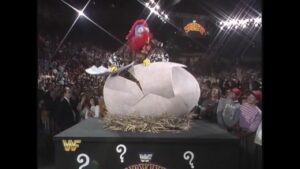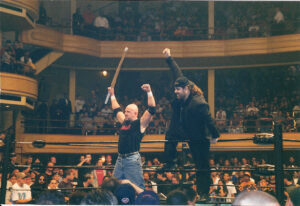This week’s episode of Vice‘s Dark Side of the Ring didn’t focus on drug addiction and death, as many of the others have. At least not the death of a person. However, it did talk about the death of a company and one of the biggest reasons that it died. This week’s episode was about the Hulk Hogan/Jeff Jarrett “match” that World Championship Wrestling (WCW) put on at Bash at the Beach 2000.
Here is what we learned from this episode.
EXCLUSIVE CLIP
Moments before showtime, creative tensions between Eric Bischoff and Vince Russo come to a head.
“Bash at the Beach 2000” premieres tomorrow at 10pm on @vicetv. pic.twitter.com/feh0zexPSc
— Dark Side of the Ring (@DarkSideOfRing) July 31, 2023
Vince Russo’s “Crash TV” Was a Response to WCW Nitro
One of the main characters of this Dark Side of the Ring episode (and of wrestling in the late 1990s, if we’re being honest) was Vince Russo. Russo rose through the ranks of the World Wrestling Federation (WWF, now WWE) to eventually become the head writer for WWE Monday Night Raw.
When WCW Nitro started crushing Vince McMahon‘s company in ratings, Russo created a style of television called “crash TV.” It was designed to be fast, constantly moving, and filled with short bursts of action that happened back-to-back-to-back all night long. Russo states that this was done so that viewers watching at home wouldn’t have a chance to flip the channel to Nitro.
Russo Went to WCW Because he was Overworked
While Russo found success as the head writer on Raw, he encountered a problem when WWF’s popularity resulted in the creation of a second prime-time show: SmackDown. This meant more work for Russo and more time away from his wife and children. When he brought that up to Vince McMahon, he was allegedly told that he had made enough money to hire a nanny to look after his children.
That comment, combined with the added workload, sent Russo looking for new employment. At this point, Eric Bischoff was out as the top guy in WCW, and Vince Russo decided to head over there. Unfortunately for him, Bischoff soon returned.
Bischoff and Russo Couldn’t Work Together
The problem between Russo and Bischoff was described in the episode as a “philosophical difference” on how wrestling should be, but from the episode, it’s also clear that the two didn’t like one another. Whether they started this way or only now feel this way isn’t certain. Neither man is exactly the most trustworthy source. What is clear is that they had very different ideas for WCW television.
Because this is wrestling, it was decided that this real-life struggle should be turned into a storyline, with Russo leading the “New Blood” stable while Bischoff commanded the “Millionaires’ Club.” This angle didn’t catch on like they hoped it would.
Hulk Hogan has Creative Control Over his Finishes
One of the biggest issues WCW had at the time, chronicled heavily in this Dark Side of the Ring episode, was that Hulk Hogan had complete creative control over the finishes of his matches. This meant that if he didn’t want to lose, he wasn’t going to lose. That made booking difficult, especially by 2000 when Hogan was no longer the draw he once was.
Russo talks about how he could tell Hogan didn’t trust him as soon as Russo walked into the company. Bischoff and Hogan were obviously close, so that caused even greater conflict between Russo and Bischoff. However, technically it was Bischoff’s job to oversee Russo, while Russo was in charge of writing the shows. This turned out about as well as you’d expect it to.
“Worked Shoots” Ruined Everything
WCW at the time (and, if we’re being fair, wrestling as a whole) loved the idea of the “worked shoot.” The company loved keeping fans guessing about what was real and what wasn’t. When done properly, these angles can attract attention to a show. When not done properly, you get WCW in 2000.
At the time, Jeff Jarrett was WCW champion and Russo says that his idea was to have Jarrett beat several big names and then eventually lose to Booker T. The last of those big names was Hogan. According to Russo, he wrote the show so that Hogan looked strong, but Jarrett still won the match. Hogan disagreed with that booking, so Russo says he rewrote it so Hogan looked even stronger, but Jarrett still left with the title. That didn’t work for Hogan, brother.
Rather than lose to Jarrett, Hogan and Bischoff came up with the idea of a worked shoot where the competitors wouldn’t “follow the script” and that would result in Jarrett getting upset with Hogan’s politics and Hogan would somehow win the WCW title. It sounds like a mess.
However, due to Jarrett’s actions, Hogan would be angry enough in character that he would “walk out” with the belt. They planned to have Hogan return months later at Halloween Havoc with the physical championship to start an angle with whoever was the recognized champion at the time. While no one knew what this angle was supposed to accomplish, it’s speculated that it was supposed to play off the Montreal Screwjob and get attention to the product.
Russo, upset that this plan was thrown at him just before the show began, decided to counter that worked shoot with another worked shoot and everything fell apart.
In Russo’s angle, Jarrett would lie down in the ring and allow Hogan to beat him. Not even Jeff Jarrett liked this idea, but he went along with it. Jarrett allowed Hogan to beat him while the announcers talked about how “this isn’t part of the rundown for the show” which was as bad as it sounds. Hogan won, took the title, got angry at Russo on the mic, and he and Bischoff left the building.
At this point in the evening, Hogan and Bischoff thought that everything was going according to their plan. However, Russo came out later that night, after Hogan and Bischoff had left the area, and cut a scathing promo on Hogan. He proclaimed that Jarrett was still the champion and that you’d never see Hulk Hogan in WCW again. He then booked a match for that night between Jarrett and Booker T for the title. Booker T won.
Hogan Sued WCW
Bischoff says that nothing after the Jarrett/Hogan match was planned or told to them and that Hogan was very upset about Russo’s promo and the whole situation. He was so upset, in fact, that he took legal action against Russo and WCW for defamation and breach of contract. According to Hogan, the way they did things went against the creative control that he had in his contract.
Russo argues that he cut the promo as his wrestling character against the wrestling character of Hulk Hogan, so it can’t be considered defamation. There’s also a whole mess about Hogan allegedly sending an after-hours fax to WCW offices the night of the show saying he was exercising his creative control. As Dave Meltzer says, this is a story involving several serial liars from over 20 years ago, so it’s hard to know what really happened.
The first judge threw out the case, but after an appeal, the two sides settled out of court.
WCW Didn’t Last Much Longer
As this entire situation demonstrates, WCW was in a bad state at the time. Not only was there a lot of backstage chaos, but the company was cutting costs due to a corporate merger between AOL and Time Warner (who owned WCW). This merger ended up killing the company.
Bischoff tried to buy WCW, but the deal fell through after AOL Time Warner effectively canceled all WCW programming. It wasn’t worth the money to him without the TV time, so him and his investors were out. In early 2001, less than a year after Bash at the Beach 2000, Vince McMahon swept in, bought his competition, and WCW company was history.
More From LWOS Pro Wrestling
Header photo – Vice. Stay tuned to the Last Word on Pro Wrestling for more on this and other stories from around the world of wrestling, as they develop. You can always count on LWOPW to be on top of the major news in the wrestling world, as well as to provide you with analysis, previews, videos, interviews, and editorials on the wrestling world. Catch Dark Side of the Ring on VICE, with new episodes airing each Thursday at 9 PM EST.






